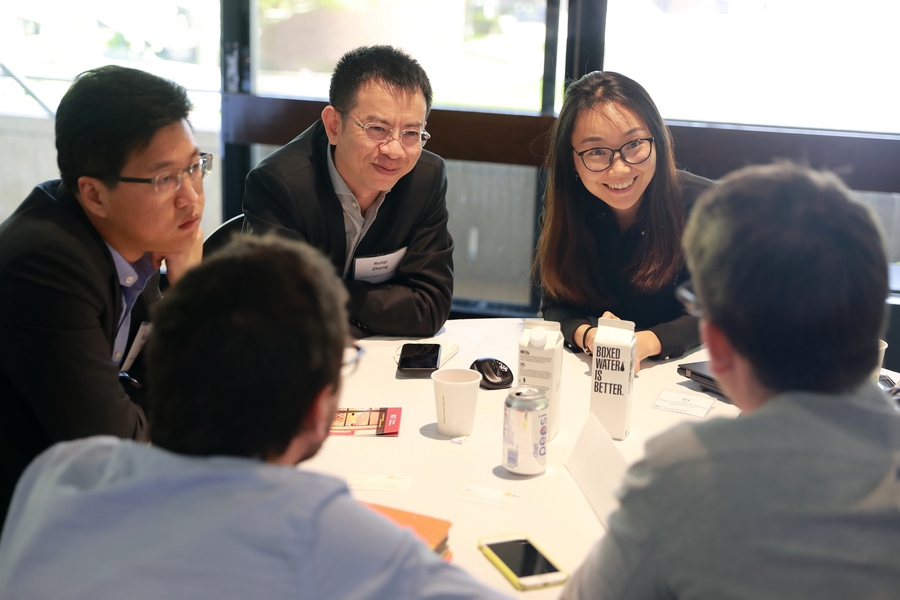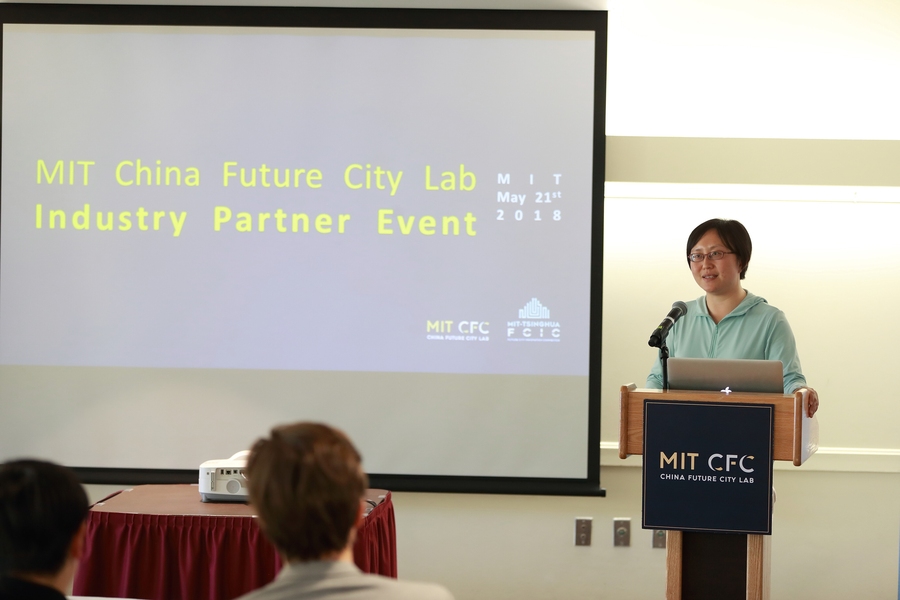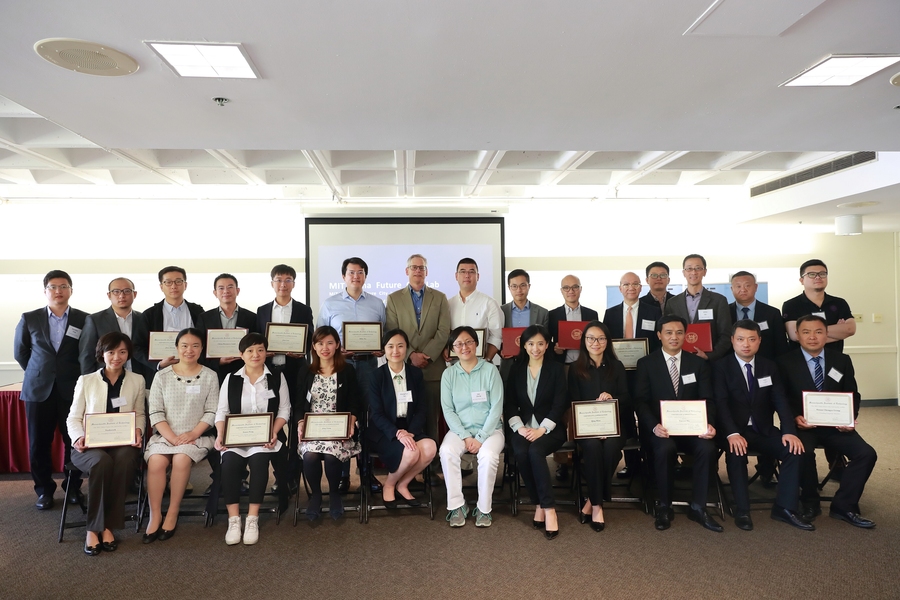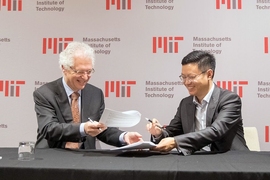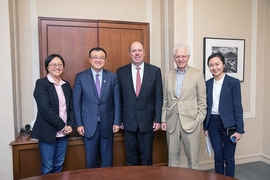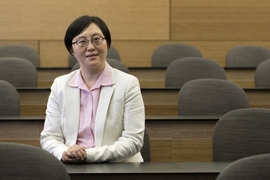Ten MIT startups have been selected for the inaugural cohort of the China Venture Workshop, jointly sponsored by the MIT China Future City Lab’s (CFC) China Future City Innovation Connector (FCIC) and DesignX, the School of Architecture and Planning’s accelerator for innovation in the built environment. The startups, with goals ranging from clean energy to job creation, aim to launch ventures in China to solve problems associated with urbanization.
The FCIC prepares teams of innovators to tackle the problems of urbanization by working with those active in the Chinese urban development industry. The program pairs teams from MIT with academic advisors at Tsinghua University and the Chinese Academy of Science, and with leading industry and civic actors, to guide them through a local pilot launch process. The program also provides essential business skills and insights for operating in China, including how to work closely with the government and how to engage customers.
“If we want to solve the challenges of cities in China, as well as around the world, we need innovative companies to deploy solutions on the ground,” says Siqi Zheng, faculty director of the China Future City Lab. Zheng is an urban and environmental economist whose research focuses on Chinese cities.
“China, however, is a hard market to penetrate,” she says. “We offer teams the knowledge, connections, and support to launch successfully in China. The CFC Lab is developing a systematic approach to identifying urban challenges in Chinese cities that are local to each city but that also share some characteristics, and then design procedures to better match the technological and social innovations with those challenges.”
The workshop is a two-week intensive summer program led by faculty and staff from CFC, DesignX, and Tsinghua University, where the program will partly take place. It will introduce entrepreneurial teams to potential investors, resources, and experts in their fields as they turn their ideas and inventions into tangible ventures. The startups will also travel to other Chinese cities that are leaders in innovation to identify potential pilot locations and meet with local leaders and innovators.
“China presents unique opportunities for innovation in design, cities, and the built environment,” says Professor Dennis Frenchman, faculty director of DesignX, who has worked in China for more than 30 years. “We find that cities are willing to experiment with new technologies and patterns of development that will improve urban livability.”
On May 21 the teams met with over 30 of the CFC’s Chinese industrial partners to demonstrate their progress and solicit feedback before they embark on the piloting trip.
“The fact that FCIC teams will have the opportunity to work with influential real estate conglomerates, city governments, and academic researchers in Greater China will provide a significant advantage to these ambitious urban innovation startups,” said CFC’s executive director, Zhengzhen Tan, who designed and developed the FCIC program in cooperation with DesignX and Tsinghua University.
According to Tan, the workshop received 25 applications that featured a wide variety of creative and innovative ideas. FCIC, DesignX, and industry partners evaluated written applications, listened to pitches, and conducted interviews to choose the teams.
Gilad Rosenzweig, executive director of DesignX, has been working with dozens of startups that are making an impact in cities. “This opportunity to engage in modern Chinese city making is unique,” says Rosenzweig. “DesignX was created to help design and deploy ideas and technology to improve design, cities, and the human experience. Partnering with the CFC Lab and Tsinghua University will support exponential growth for everyone involved.”
These are the startups:
AdaViv uses artificial intelligence to help indoor agriculture companies monitor their crops and make adjustments to growing conditions to optimize results. AdaViv’s founders are particularly interested in China’s expanding herbal medicine market.
Biobot Analytics deploys robotic sensors in urban sewer systems to help governments collect and evaluate real-time public health data, such as the prevalence of opioids and other drugs. They have completed experiments in the U.S., Kuwait, and South Korea.
CitoryTech allows individuals to familiarize themselves with their community by employing innovative data to lead residents on outings to explore their cities.
Constructure matches various construction industry participants to increase transparency between employers and their potential employees.
Gaia Elements is developing a kite-powered system to generate energy from wind. They are seeking to expand this innovative technology in China, the world’s largest clean energy market.
Kawsay connects infrastructure providers with people living in informal communities and provides data analysis and tools to help the providers manage business growth, explore new markets, and track impact. Their first project was improving water delivery in Lima, Peru, and the team is now working to expand their data collection and forecasting in larger markets.
Multimer collects, visualizes, and analyzes geolocated data transmitted by wearable technology to inform human-centered spatial design and decisions. They have previously partnered with the United Nations, Harley-Davidson, and IBM to help the organizations understand how their users, employees, and customers utilize a space.
Roots Studio digitizes the creative content of traditional artists from remote areas around the world and connects them to the $32-billion global art, interior decor, and design licensing markets.
Shurong Data provides behavior chain analysis using advanced data collection technologies to initiate and aid smarter real estate development and urban planning.
VThree.AI uses artificial intelligence to empower smart buildings and smart urban life, focusing initially on the problem of energy waste in cities by monitoring and identifying “top waster” devices and rooms in buildings.
In addition, the MIT teams will be joined in China by six startups associated with Tsinghua University:
Air Faucet System replaces water used during hand-washing with high-speed air flow, achieving the same cleanliness while cutting water use by 90 percent.
Galloon extracts and treats moisture from the air, turning it into safe drinking water. They are developing technology for use by both individuals and cities.
LeanFM Technologies employs artificial intelligence to monitor the status of household and office devices and predict impending mechanical failure.
Linktravel collects and analyzes commuter data to provide consumers with schedules and help transportation companies improve their efficiency.
Sponge Public Restgardens uses sponge technology to absorb rainwater for use in public restrooms and nearby artificial ponds, creating both efficient bathrooms and urban beauty.
Zhongyan Parking increases the efficiency of underground parking by building vertical shafts that can accommodate ten times as many cars as a typical parking lot of the same size.
Zheng, who also serves as the Samuel Tak Lee Associate Professor of Real Estate Development and Entrepreneurship, says that she is optimistic about the positive change that the combination of visionary startups and knowledgeable partners will bring about.
“This program has the potential to help combat the issues of urbanization in China in an innovative and creative manner that could improve people’s urban living experiences,” Zheng says. “Even in only our first year, we think the program is going to have an immediate impact.”
